Litter 'nightmare' as street cleanliness worst on record
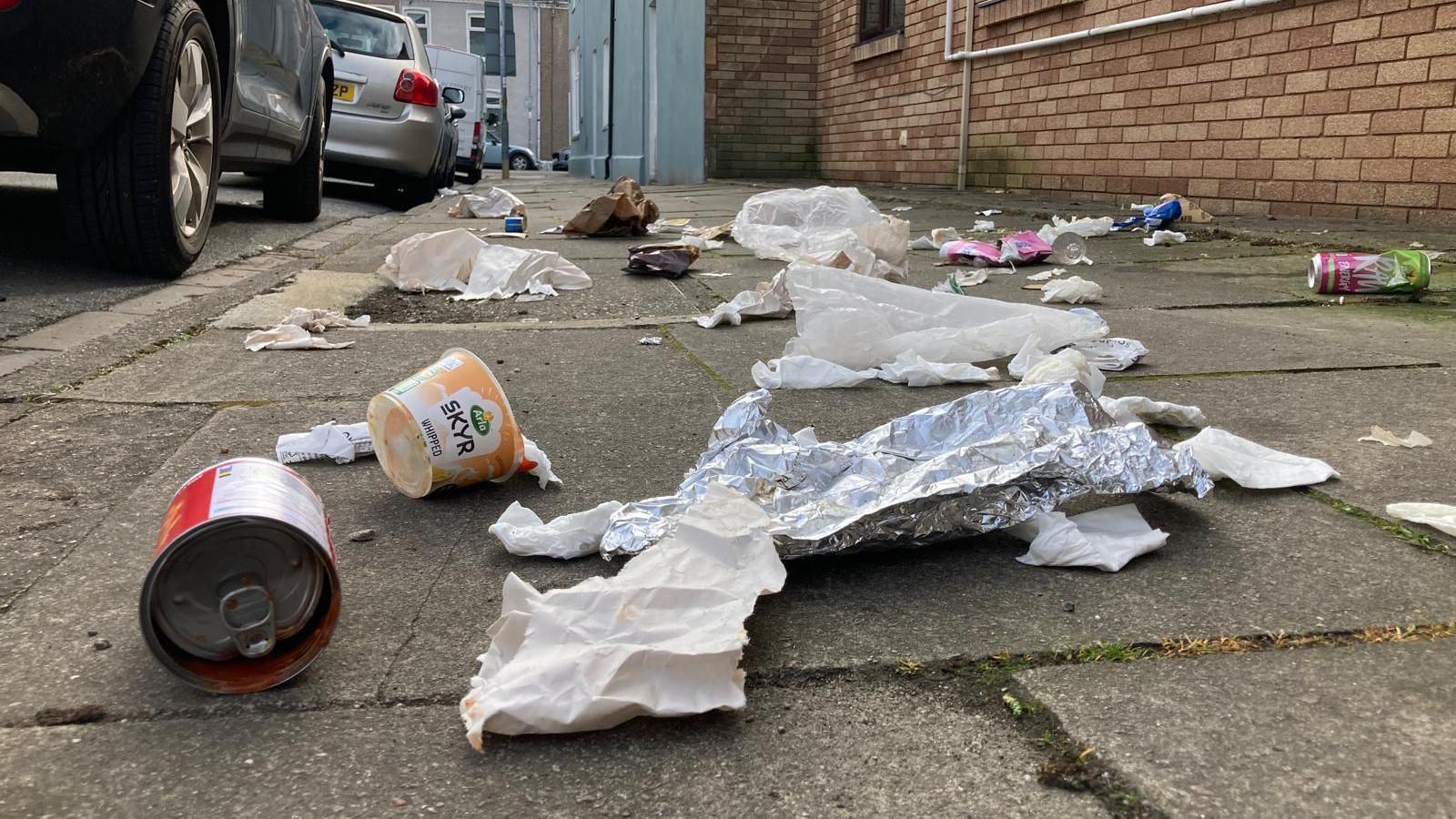
Litter is a particular problem in towns and cities, campaigners have warned
- Published
Littering has reached a "crisis point," campaigners have said, after surveys of street cleanliness across Wales revealed the worst situation on record.
Keep Wales Tidy said the rise was mainly being driven by a "huge increase" of on-the-go food and drinks packaging, as well as pressure on council street cleaning budgets.
Councils told BBC news they were "struggling" to maintain budgets to clear litter in the face of increased costs in other areas, like social care.
The Welsh government said it was working with local authorities and others to ensure "more clean and cared for areas".
River clean-up sees 2,000 tyres pulled from water
- Published30 August 2023
Keep Wales Tidy's annual report found the worst results for street cleanliness in the 17 years since the charity's surveys began.
Keep Britain Tidy said it was an issue right across the country and "only a small fraction of locations" in England were completely litter free.
Despite declaring "a litter emergency" in 2022, Keep Scotland Beautiful also warned that litter levels continued to rise.
In Wales, the problem was found to be worst in towns and cities - with more than 35% of urban areas seeing "unacceptable" levels of litter.
There was also a 286% increase in the number of the most dirty streets, graded "D" for cleanliness.
Smoking-related litter and food and drinks packaging were the most common types of litter found.
Malcom Davies says he's getting "too old" to be picking up after other people to keep his area nice
In Cardiff, where the council spends more than £7m a year on street cleaning, the worst performing "D" streets were found in some of the city's most deprived neighbourhoods, including Ely, Roath, Grangetown and Splott.
Splott resident Malcolm Davies said the level of litter in and around his home was "just a nightmare".
"I live in the end house and we get whatever is chucked - fruit peelings, wrapping paper blowing into our garden," he said.

Malcolm Davies says littering near his home is so bad that he would like to see cameras installed
"We put it in our own bins to keep the garden tidy - but I'm getting too old now for all this litter picking."
Fly-tipping was another problem, he said, adding he would like to see cameras installed to deter offenders.
"We've had it all - beds, settees, cabinets - everything," Mr Davies added.
"It's not very nice if you've got people coming down to visit, and all they can see is rubbish."
'Heart-breaking'
Fellow Splott resident Lynne Thomas, who organises monthly volunteer litter picks, said much of the litter was caused by people incorrectly putting their bins out.
"The seagulls are getting savvy - if there's any food elements in any of the bags they're there in seconds - they will have it, they will shred it and strew it across the streets," she said.
"If everyone uses the right caddies and bags then that's one step towards keeping the streets cleaner."
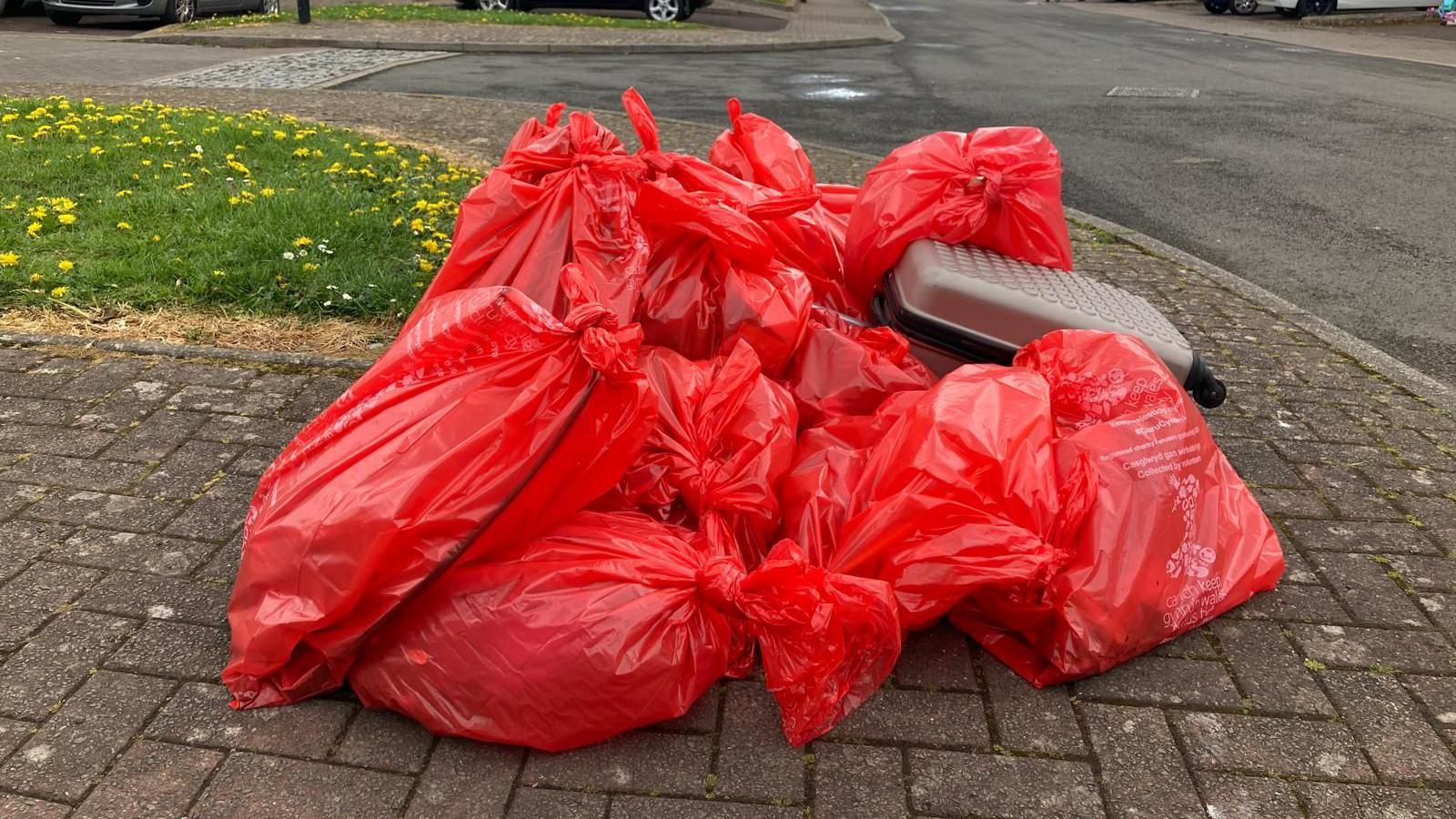
Bagged litter and illegally dumped waste collected by volunteers during one gathering in Splott, Cardiff
Ms Thomas said the situation could be upsetting.
"It can be heart-breaking to be honest - it can really affect people's mental health.
"People who've lived here all their lives and they've said to me lately that they're distressed by the amount of litter on the streets," she added.
She urged people to "be proactive and help each other out" by joining litter picks, and reporting dumped waste to the council.
The illegal dumping of waste, known as fly-tipping, is also an issue in the area.
"[This] is obviously an illegal fly-tip of what looks like domestic waste," explained Gareth Davies from Keep Wales Tidy, in reference to a large pile of rubbish in a gully between the housing estate and a main road.
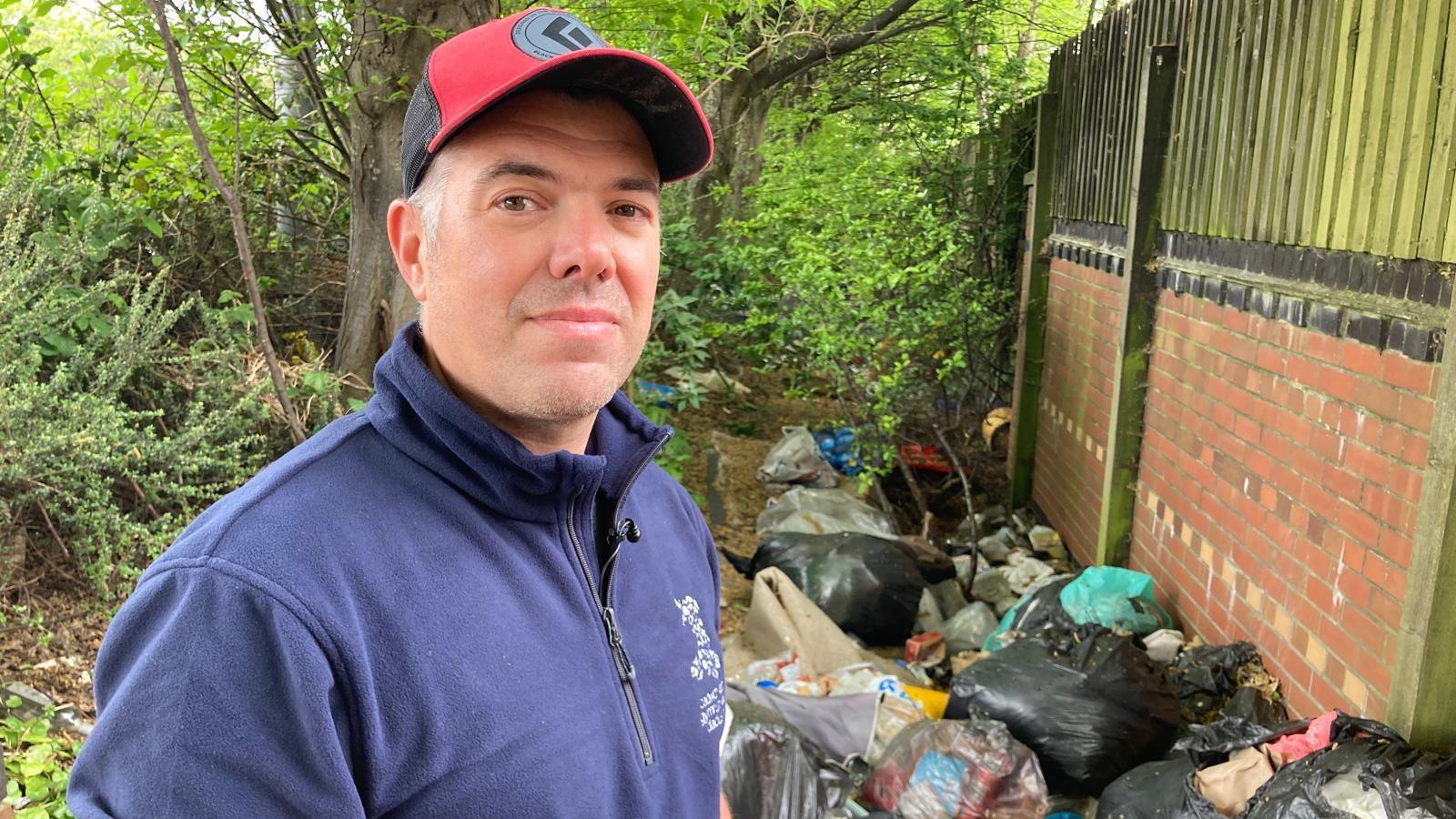
Gareth Davies says fly-tipping, as seen behind him in Splott, is often carried out by people from outside the area
"Often this isn't local residents, but rather people fly-tipping in other people's communities," he said.
"This has a huge impact - there's the mental health side of seeing litter every day as you walk in and out of the estate.
"But also things like the smell on a hot day, rats making home in your garden, even coming into your house."
'Selfish people'
Cardiff councillor Norma Mackie, cabinet member for waste, said "littering, whether dropped on the ground or thrown from vehicles, is caused by a few selfish people".
"If litterers used the litter bins provided on the street, or disposed of rubbish at home after their journey, then the money which is currently being spent on this problem could be used for other services," she said.
"I've said it before and I'll say it again - people need to take responsibility for their actions."
Councils in Wales collectively spent more than £64m on street cleaning in 2023-24.
In the popular seaside resort of Barry Island, dealing with litter is an "industrial exercise", according to the leader of Vale of Glamorgan council Lis Burnett.
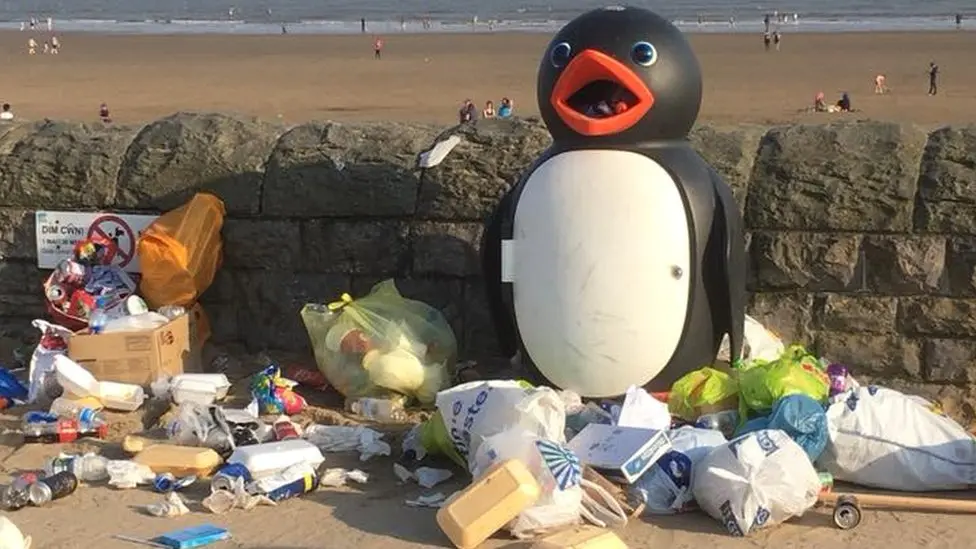
Clearing up litter at the beaches in Barry costs the local council about £800,000 a year
The council deals with more than 250 tonnes of litter a year across Barry's beaches, costing around £800,000.
"Trying to find the money we need to provide these litter services is a real difficulty - we're all struggling with it," said Ms Burnett, who also represents the Welsh Local Government Association (WLGA).
The need for increased funding for education and social care had meant other budgets were being squeezed, she warned.
"It's a huge issue for every single local authority in Wales," she added.
Both the WLGA and Keep Wales Tidy have urged the Welsh government to move ahead with delayed plans to force packaging producers to pay towards the costs of clearing litter.
A long-awaited deposit return scheme for bottles and cans has also been held up following disagreements with the UK government over Wales' decision to include glass.
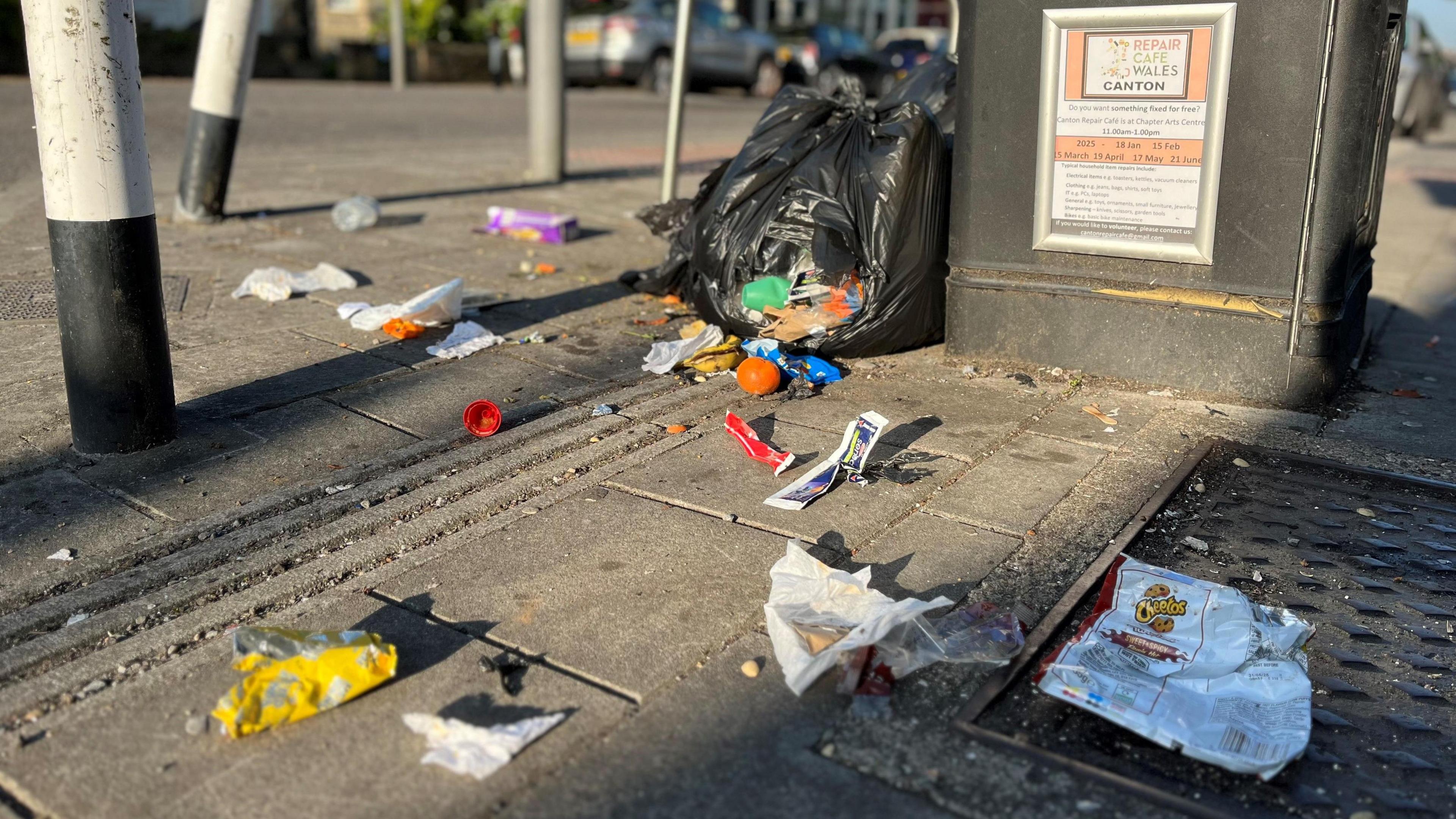
Littering is a "huge issue" for all local councils in Wales, says the WLGA
Owen Derbyshire, Keep Wales Tidy's chief executive officer, said the Welsh government was "taking important steps" but needed a long-term plan for reducing street litter.
"This is a rising tide that we are really struggling to stop at the moment," he said, adding that huge increases in on-the-go food and drinks packaging were "driving quite scary behaviours".
The charity wants mass public education campaigns, stronger enforcement of litter laws and "a move away from single-use culture".
But Mr Derbyshire said this was not just a matter for the government or councils.
"Citizens, businesses, councils, and charities [should come] together to take shared responsibility for this growing problem," he said.
The Welsh government said: "Tackling litter and local environment issues is key and that is why we have provided Keep Wales Tidy with further funding to co-ordinate volunteer clean-up activities, monitor litter levels and deliver positive behaviour change campaigns right across the country."
A spokesperson added that it had also introduced a new packaging extended producer responsibility scheme and was working on a deposit return scheme that worked for Wales, with both measures helping to reduce littering and waste.
Related stories
- Published8 March 2023


